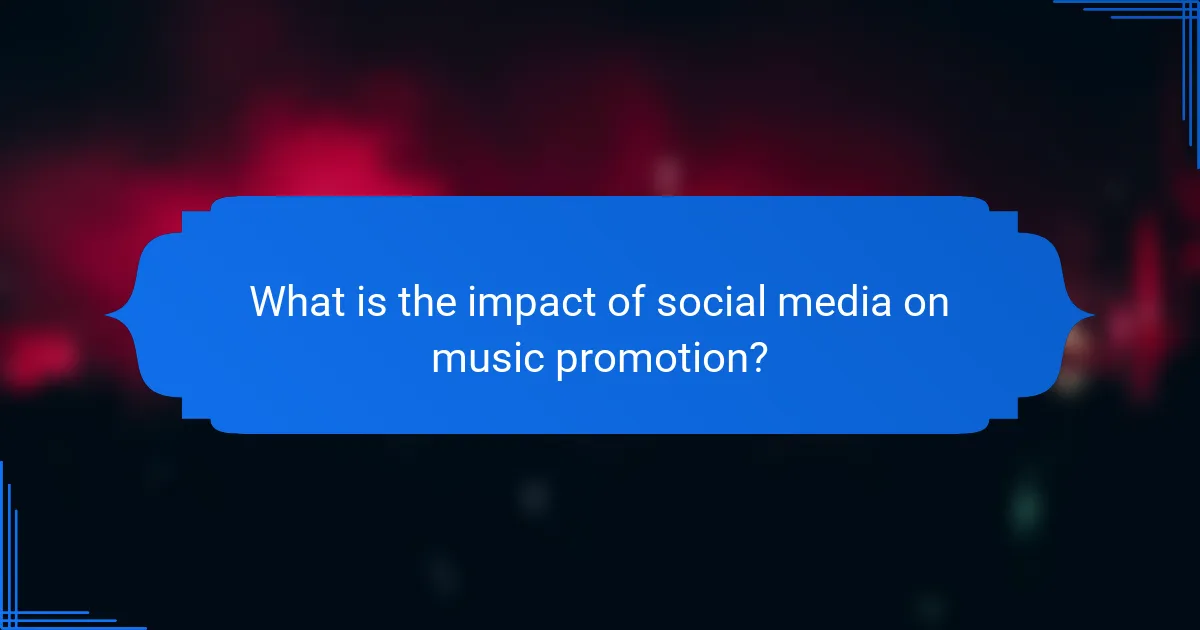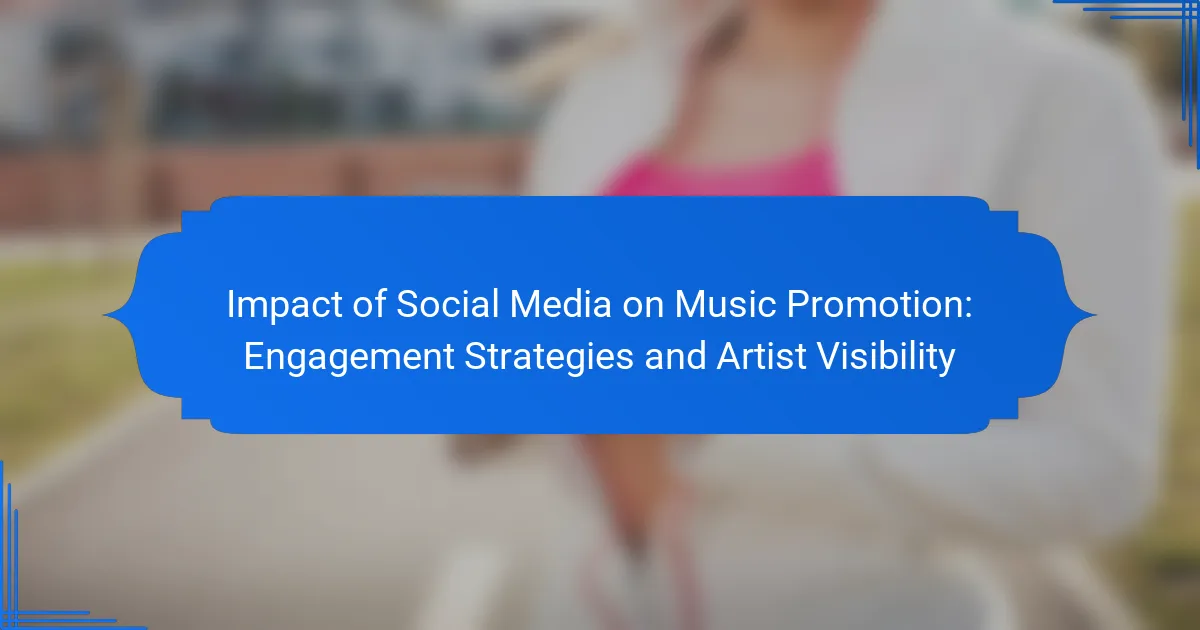Social media plays a vital role in music promotion by facilitating direct connections between artists and their fans. Platforms such as Instagram and TikTok enable artists to leverage viral marketing through user-generated content, significantly increasing their visibility. Research indicates that 70% of music listeners discovered new artists via social media in 2020, highlighting its importance in fostering a loyal fanbase. Additionally, social media provides real-time feedback, allowing artists to refine their promotional strategies, while targeted advertising effectively reaches specific demographics. Overall, social media is an essential tool for modern music promotion, enhancing engagement strategies and artist visibility.

What is the impact of social media on music promotion?
Social media significantly enhances music promotion. It allows artists to connect directly with fans. Platforms like Instagram and TikTok enable viral marketing through user-generated content. In 2020, 70% of music listeners discovered new artists via social media. This direct engagement fosters a loyal fanbase and increases visibility. Social media also provides real-time feedback, allowing artists to adapt their strategies. Additionally, targeted advertising on these platforms can reach specific demographics effectively. Overall, social media is a crucial tool in modern music promotion.
How has social media transformed traditional music promotion strategies?
Social media has significantly transformed traditional music promotion strategies by enabling direct artist-to-fan communication. Artists can now engage with their audience in real-time through platforms like Instagram, Twitter, and TikTok. This shift allows for more personalized marketing approaches. Traditional methods relied heavily on radio play and physical distribution, which limited audience interaction. Social media facilitates viral marketing through shares and user-generated content. For example, songs can gain popularity through challenges or trends on TikTok, leading to increased streaming numbers. According to a 2021 study by the International Music Summit, over 70% of artists reported that social media was crucial for their promotional efforts. This data underscores the essential role social media plays in modern music promotion.
What are the key differences between traditional and social media promotion?
Traditional media promotion primarily relies on established channels like television, radio, and print. These methods often have a one-way communication style. They deliver messages to a passive audience. In contrast, social media promotion utilizes platforms like Facebook, Instagram, and Twitter. This approach encourages two-way interaction between artists and fans. Social media allows for real-time engagement and feedback. According to Statista, 4.9 billion people use social media worldwide as of 2021. This vast audience provides a broader reach for artists compared to traditional media. Additionally, social media promotion is generally more cost-effective. Traditional media often involves high production and distribution costs. Social media enables targeted advertising based on user demographics and interests. Thus, the key differences lie in communication style, audience engagement, reach, and cost-effectiveness.
How do social media platforms facilitate music discovery?
Social media platforms facilitate music discovery by providing users with personalized recommendations and extensive sharing capabilities. Algorithms analyze user behavior to suggest new artists and songs based on listening habits. Platforms like Spotify and YouTube leverage user-generated playlists to showcase emerging talent. Social media also enables artists to connect directly with fans, creating a community around their music. Viral trends and challenges on platforms like TikTok can propel songs to mainstream success. Additionally, influencers and content creators often promote new music, reaching wider audiences. Statistics show that 70% of users discover new music through social media. This interconnectedness enhances visibility for both established and emerging artists.
What role does engagement play in music promotion on social media?
Engagement is crucial in music promotion on social media. It fosters a connection between artists and their audience. Higher engagement rates lead to increased visibility of posts. Social media algorithms often prioritize content that generates interactions. This means likes, shares, and comments can amplify an artist’s reach. For instance, posts with high engagement can appear on more users’ feeds. Engaging content encourages fans to share it, further expanding its audience. Studies show that artists with active engagement strategies gain more followers and streams. Therefore, effective engagement directly correlates with an artist’s promotional success on social media.
How can artists effectively engage their audience on social media?
Artists can effectively engage their audience on social media by creating interactive content. This includes polls, Q&A sessions, and live performances. Regularly posting behind-the-scenes content also fosters a personal connection. Engaging with followers through comments and messages builds community. Utilizing stories and short videos can showcase personality and creativity. Collaborating with other artists expands reach and introduces new audiences. Consistent branding and messaging help maintain audience interest. According to a 2021 survey by Hootsuite, 54% of users prefer brands that interact with them on social media.
What types of content drive engagement for music promotion?
Video content drives engagement for music promotion. Platforms like Instagram and TikTok prioritize video, increasing visibility. Live performances and behind-the-scenes footage attract viewers. User-generated content encourages community involvement. Interactive posts, such as polls and Q&As, enhance audience participation. Shareable content, like memes or challenges, expands reach. Consistent updates keep followers engaged and informed. According to a study by the Music Industry Research Association, video posts generate 1200% more shares than text and images combined.
Why is artist visibility important in the digital age?
Artist visibility is crucial in the digital age because it directly influences an artist’s reach and success. Increased visibility allows artists to connect with a broader audience. Social media platforms have over 4.7 billion active users globally. This vast audience presents opportunities for artists to showcase their work. Engaging content can lead to higher follower counts and fan engagement. Studies show that artists with strong online presence often achieve greater streaming numbers. For instance, a report by Nielsen Music found that social media engagement significantly correlates with music sales. Thus, visibility enhances an artist’s potential for growth and recognition in a competitive industry.
How does increased visibility affect an artist’s career?
Increased visibility positively affects an artist’s career by expanding their audience reach. A larger audience can lead to more opportunities for collaboration and performance. Visibility can enhance an artist’s brand recognition and credibility. According to a 2021 study by the Music Industry Research Association, artists with higher visibility on social media platforms see a 30% increase in engagement. This engagement often translates into increased sales and streaming numbers. Furthermore, more visibility can attract the attention of record labels and industry professionals. Ultimately, increased visibility creates a cycle of growth and opportunity for artists.
What are the challenges artists face in gaining visibility on social media?
Artists face several challenges in gaining visibility on social media. One major challenge is the oversaturation of content. Millions of posts are shared daily, making it difficult for individual artists to stand out. Algorithms used by platforms often prioritize established accounts, limiting exposure for emerging artists. Additionally, artists may struggle with understanding platform algorithms and changing trends. This can hinder their ability to create engaging content that resonates with audiences.
Another challenge is the need for consistent engagement. Artists must regularly interact with followers to maintain visibility. This requires time and effort that may detract from their creative process. Limited marketing budgets can also restrict artists’ ability to promote their work effectively. Many rely on organic reach, which can be unpredictable.
Lastly, negative feedback or online trolling can discourage artists. This may affect their confidence and willingness to share their work. Overall, these challenges create significant barriers for artists seeking to enhance their visibility on social media.
How can artists leverage social media for better engagement and visibility?
Artists can leverage social media by creating engaging content and interacting with their audience. Regularly posting high-quality visuals and videos can capture attention. Utilizing platforms like Instagram and TikTok can enhance visibility due to their algorithm favoring creative content. Engaging with followers through comments and direct messages fosters a sense of community. Collaborating with other artists or influencers can expand reach and attract new fans. Hosting live sessions or Q&A can increase real-time interaction and engagement. According to a 2021 survey by Hootsuite, 54% of social media users use platforms to discover new music. This highlights the importance of a strong social media presence for artists.
What are the best practices for using social media in music promotion?
The best practices for using social media in music promotion include consistently engaging with fans, sharing high-quality content, and utilizing targeted advertising. Engaging with fans builds a loyal community. Regularly responding to comments and messages fosters connection. High-quality content, such as professional music videos and behind-the-scenes footage, attracts attention. Posting consistently keeps the audience engaged. Targeted advertising helps reach specific demographics. Platforms like Facebook and Instagram offer tools for this. Collaborating with influencers can expand reach. According to a study by the Pew Research Center, 69% of adults in the U.S. use social media, highlighting its importance in reaching audiences.
What tools and strategies can enhance social media presence for artists?
Artists can enhance their social media presence by utilizing various tools and strategies. Consistent posting schedules on platforms like Instagram and TikTok can increase visibility. Engaging with followers through comments and direct messages fosters community. Using analytics tools helps artists understand audience behavior and optimize content. Collaborating with influencers can expand reach to new audiences. Creating visually appealing content, such as videos and graphics, captures attention effectively. Utilizing hashtags strategically can improve discoverability in searches. Live streaming events or Q&A sessions can enhance real-time engagement. These methods collectively contribute to a stronger online presence for artists.
How can artists measure the effectiveness of their social media campaigns?
Artists can measure the effectiveness of their social media campaigns by analyzing engagement metrics. Key metrics include likes, shares, comments, and follower growth. Monitoring these metrics provides insights into audience interaction and content performance. Tools like Google Analytics and social media insights can track these data points. Additionally, artists can assess conversion rates, such as website visits or merchandise sales linked to social media promotion. Surveys and feedback from fans can also gauge audience sentiment. Research indicates that campaigns with higher engagement metrics correlate with increased visibility and fan loyalty.
What common mistakes should artists avoid in social media promotion?
Artists should avoid inconsistency in their posting schedule on social media. Regular posting helps maintain audience engagement. Infrequent updates can lead to decreased visibility and follower loss.
Another mistake is neglecting audience interaction. Failing to respond to comments and messages can create a disconnect with followers. Engaging with fans fosters community and loyalty.
Additionally, artists should avoid focusing solely on self-promotion. Overly promotional content can alienate followers. A balanced approach that includes personal stories and behind-the-scenes content is more effective.
Not utilizing analytics tools is also a common error. These tools provide insights into audience behavior and preferences. Understanding these metrics can inform better content strategies.
Lastly, artists should avoid ignoring platform-specific trends. Each social media platform has unique features and trends. Adapting content to fit these can enhance reach and engagement.
The primary entity of this article is the impact of social media on music promotion, emphasizing engagement strategies and artist visibility. The article outlines how social media platforms facilitate direct communication between artists and fans, transforming traditional promotion methods by enabling real-time interaction and personalized marketing. It highlights the importance of engagement, visibility, and effective content strategies in reaching broader audiences and enhancing an artist’s career. Additionally, it addresses the challenges artists face in gaining visibility and offers best practices for maximizing social media effectiveness in music promotion.
